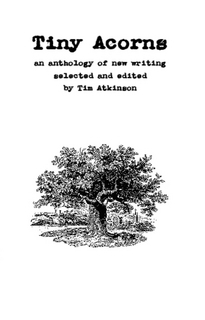Tim Atkinson's Blog, page 106
December 28, 2010
On fourth day of Christmas...
Continuing the theme of seasonal musical offerings, I give you two more - both acquired tastes I'll admit, but (in my view) well worth acquiring. First, Maddy Prior and the Carnival Band. This is how Christmas carols started. Not many people realise that (a) robed choirs a la Kings College, Cambridge are a relatively recent phenomenon , dating from the Anglican revival of the nineteenth century, and (b) Christmas carols as we sing 'em would seldon have been heard in church until about a century ago. Most were secular dance-tunes and - as such - the work of the devil (who, after all, has all the best of them so it's said!). Thus carols of all shapes and sizes as we sing them these days are not much older than a hundred years, although their history goes back in time much further. Back to the days when they'd be sung in the ale-houses and sound a little like this...
Carols were also always re-invented and refreshed. Nowadays, of course, we have John Rutter (although he only really has one tune, re-arranged and set to different words!) but back in the day, everyone would have a go at caroling (the word 'carol' means 'dance'.) Here's the late, great Jake Thackray with his contribution, Joseph. Again, an acquired taste... but worth the effort.
[image error]
Carols were also always re-invented and refreshed. Nowadays, of course, we have John Rutter (although he only really has one tune, re-arranged and set to different words!) but back in the day, everyone would have a go at caroling (the word 'carol' means 'dance'.) Here's the late, great Jake Thackray with his contribution, Joseph. Again, an acquired taste... but worth the effort.
[image error]
Published on December 28, 2010 09:27
December 26, 2010
Boxing Day
Of course, Christmas has only just begun. It's not all over, not yet. This is just day two. And if you follow the Orthodox calendar it doesn't even start until twelfth night. But to continue the theme begun in my last post, as a singer Christmas means music - lots of it - and Christmas Day, once all the concerts and carol services have finished, can sometimes seem something of an anti-climax. Which is a shame, really. Because this really is just day two of the season of goodwill, and St Stephen's Day to boot.
In case you're wondering, Stephen was the first Christian martyr, which is why he gets his day so close to the main man's. (St Paul - although then plain old Saul of Tarsus, tent-maker, held everyone's coats for them while they pelted Stephen to death with rocks, which doesn't seem very festive does it?) Anyway, you know what happened on the feast of Stephen, don't you? Yes, Good King Wenceslas looked out, that's what. So to keep the music playing, here's something you may have heard earlier but you have to hear again today. Join in if you know the words. Or even if you don't.
The Choir of York Minster is joined by Sir Thomas Allen... who sings a bit better than that chap catawauling on this page on Christmas Eve. The choirboy doesn't get a mention. But if you like your choirboys (a) getting a mention and (b) performing like a pocket diva, then have a quick peek at this version afterwards.
Altogether now...
[image error]
In case you're wondering, Stephen was the first Christian martyr, which is why he gets his day so close to the main man's. (St Paul - although then plain old Saul of Tarsus, tent-maker, held everyone's coats for them while they pelted Stephen to death with rocks, which doesn't seem very festive does it?) Anyway, you know what happened on the feast of Stephen, don't you? Yes, Good King Wenceslas looked out, that's what. So to keep the music playing, here's something you may have heard earlier but you have to hear again today. Join in if you know the words. Or even if you don't.
The Choir of York Minster is joined by Sir Thomas Allen... who sings a bit better than that chap catawauling on this page on Christmas Eve. The choirboy doesn't get a mention. But if you like your choirboys (a) getting a mention and (b) performing like a pocket diva, then have a quick peek at this version afterwards.
Altogether now...
[image error]
Published on December 26, 2010 12:52
December 24, 2010
Christmas Music
I've posted this before, last year in fact but on another, little known site I sometimes update. So not many people saw it. Which was what I intended, really.
But this year? Well, I'm running out of things to say. You see, I'm writing these posts several days in advance in case, well... in case of you-know-what. It's D-Day (or, B-Day or 'due' day) plus one now, and at any moment we could be winging our way to the hospital forthe our main event of the season. And someone asked me the other day what Christmas means to me. And I had the answer, right there and then in my hands in front of me. It was a sheet of paper with five lines (a stave) spattered with strange dots (or 'notes' as *ahem* we musicians like to call them... ahahahahaha). And they were strange - we were singing Poulenc!
But I digress. Being a singer, singing in choirs and all that usually means that Christmas is a frantic round of concerts, carols and post-performance parties. We've been rather light on the latter this year, but - as usual - there's been plenty of the former. Which is the way it's been every Christmas since I first - as a beardless youth - donned a cassock and sang 'Once in Royal David's City'. Etc.
I'm no longer a youth - or beardless, for that matter - and probably don't sing half as nicely as I did when I was a boy, although my hair in this video is almost as long as it was back then. So, for your amusement (and my embarrassment) here is a Christmas comic song performed especially for you by your humble blogging correspondent. The accompanist is Eric Wayman. You can give us your verdicts below, daaaarling.
Happy Christmas!
But this year? Well, I'm running out of things to say. You see, I'm writing these posts several days in advance in case, well... in case of you-know-what. It's D-Day (or, B-Day or 'due' day) plus one now, and at any moment we could be winging our way to the hospital for
But I digress. Being a singer, singing in choirs and all that usually means that Christmas is a frantic round of concerts, carols and post-performance parties. We've been rather light on the latter this year, but - as usual - there's been plenty of the former. Which is the way it's been every Christmas since I first - as a beardless youth - donned a cassock and sang 'Once in Royal David's City'. Etc.
I'm no longer a youth - or beardless, for that matter - and probably don't sing half as nicely as I did when I was a boy, although my hair in this video is almost as long as it was back then. So, for your amusement (and my embarrassment) here is a Christmas comic song performed especially for you by your humble blogging correspondent. The accompanist is Eric Wayman. You can give us your verdicts below, daaaarling.
Happy Christmas!
Published on December 24, 2010 09:31
December 22, 2010
Wordless Wednesday...
Wordless anyday, really. This is the view from my study window (or it was yesterday). Is it any wonder I never get anything written?



Published on December 22, 2010 07:25
December 20, 2010
Meldrew Monday
It seems when I began this feature a fortnight ago that there was something of a moaning bandwagon running. Did you know, for example, that the average Brit spends almost nine minutes moaning every day? Or that they do so on at least four occasions in each twenty-four hour period? And that the sum total of all that grumbling adds up to an amazing 1300 annual moans and groans taking up a massive 53 hours every year?
No, me neither. But it figures. Of course, some people have a lot to moan about. Others just love moaning. It's easy to tell the two apart. Some days Twitter, for example, definitely seems to lose its 'T'.
But no matter. Moaning, it seems, can sometimes be good for us. Cary Cooper, professor of organisational psychology at Lancaster University says, 'Brits enjoy a good moan'. He goes on to state that, 'Moaning serves a number of purposes and can actually help people bond at work over their shared grievances...'
Well, what's good for work is holds true for blogs. And I always said that Twitter was the watercooler chat for stay-at-home mums and dads. So what's on your mind this Monday morning? (Monday is the best time for a moan, apparently. As the weekend approaches, most of our cares melt away like snow!) The imminent arrival of Christmas? The seasonal weather? Or Pamela Stevenson on Strictly? What's making your inner Meldrew manifest itself this Monday morning?


No, me neither. But it figures. Of course, some people have a lot to moan about. Others just love moaning. It's easy to tell the two apart. Some days Twitter, for example, definitely seems to lose its 'T'.
But no matter. Moaning, it seems, can sometimes be good for us. Cary Cooper, professor of organisational psychology at Lancaster University says, 'Brits enjoy a good moan'. He goes on to state that, 'Moaning serves a number of purposes and can actually help people bond at work over their shared grievances...'
Well, what's good for work is holds true for blogs. And I always said that Twitter was the watercooler chat for stay-at-home mums and dads. So what's on your mind this Monday morning? (Monday is the best time for a moan, apparently. As the weekend approaches, most of our cares melt away like snow!) The imminent arrival of Christmas? The seasonal weather? Or Pamela Stevenson on Strictly? What's making your inner Meldrew manifest itself this Monday morning?

Published on December 20, 2010 06:37
December 18, 2010
Saturday review
At the nativity play...
Ok, so Charlie was the only king. Kings are expensive; times are hard. And yes, there may have been a few more Mary's than were strictly necessary. (Resist the obvious comment please!) But there was certainly a host of angels, and a veritable hoard (or 'pen' maybe, or even crook - what is the collective noun?) of shepherds. And of course there were tears, there was laughter and a story so familiar, and yet still fresh every year.

Posted using BlogPress from my iPhone4

Ok, so Charlie was the only king. Kings are expensive; times are hard. And yes, there may have been a few more Mary's than were strictly necessary. (Resist the obvious comment please!) But there was certainly a host of angels, and a veritable hoard (or 'pen' maybe, or even crook - what is the collective noun?) of shepherds. And of course there were tears, there was laughter and a story so familiar, and yet still fresh every year.

Posted using BlogPress from my iPhone4
Published on December 18, 2010 04:54
December 16, 2010
Do as you would be done by...
Lead by example. That's what I've always believed, even if I've never quite lived up to the ideal. But ideal it is. I really do believe that the most powerful learning tool is demonstration: as a trainee teacher, I was shown the single most important lesson that I think I ever learnt - to model the behaviour you expect. That doesn't mean wearing a school uniform, waiting in the playground for the bell to go and so on; teachers aren't pupils and can't be expected to do the same things pupils do. But teachers - by the very nature of their job - expect pupils to behave a certain way. And believe me, you can tell them till you're blue in the face and adopt any number of reinforcement strategies, but if you don't model the behaviour that you want then you're a loser. Nothing more simple, nothing more true (to paraphrase Philip Larkin).
I remember standing at the back of an assembly hall at my last school, desperately frustrated as a senior member of staff nattered to a colleague while at the same time expecting silence from the serried ranks of school boys waiting for the main event. But it just doesn't work that way.
I was teaching Albert Bandura on Tuesday. People who know the name think it's all about the effect of violence (as in films) on children's behaviour. And in a way, it is. But it's also much, much more. As the following film show, children see and children do. The single most powerful influence on what we all do comes from what we see others doing. It can work both ways, of course. As adults, we're as likely to react against something we see as to do it. But children - malleable, impressionable - take what they see more at face value.
No lesson is more effective than that which can be seen to be true. No amount of story-telling, shouting, instructing, cajoling or persuading can match what a child sees with its own eyes. We've evolved that way. It's what makes us what we are. And it means we've got to take care.
They don't call them role models for nothing...

I remember standing at the back of an assembly hall at my last school, desperately frustrated as a senior member of staff nattered to a colleague while at the same time expecting silence from the serried ranks of school boys waiting for the main event. But it just doesn't work that way.
I was teaching Albert Bandura on Tuesday. People who know the name think it's all about the effect of violence (as in films) on children's behaviour. And in a way, it is. But it's also much, much more. As the following film show, children see and children do. The single most powerful influence on what we all do comes from what we see others doing. It can work both ways, of course. As adults, we're as likely to react against something we see as to do it. But children - malleable, impressionable - take what they see more at face value.
No lesson is more effective than that which can be seen to be true. No amount of story-telling, shouting, instructing, cajoling or persuading can match what a child sees with its own eyes. We've evolved that way. It's what makes us what we are. And it means we've got to take care.
They don't call them role models for nothing...
Published on December 16, 2010 06:03
December 14, 2010
Octonauts, let's do this!
You've got to love a children's TV programme that can teach a two year old the word - and concept - symbiosis. Charlie's taken to this relatively recent addition to the CBeebies schedule with alacrity; we seldom watch anything else these days. And although - to date - I've rather been immune to the charms of Captain Barnacles and his crew, I still went Christmas shopping for some Octonaut merchandise the other day because I know - I can predict with the utmost certainty - that there would be a beam on his little face as shiny as the sun if Charlie were to unwrap a smart Gup C or if he were to come across Captain Barnacles in his Christmas stocking.
But do you know what? Nothing, nadda, nyet, nought. Maybe they weren't sure how it would go down in the UK? (I'm pretty sure that it's an American import and that the voices are dubbed.) But what a missed opportunity? Anyway, if like me you've got a little boy who wants - nay, needs - his very own Gup C, you're in the right place today. Because in the very best Blue Peter tradition, I'm going to show you how to make one. And there won't be a single sheet of sticky-backed plastic.
What you will need is a couple of empty plastic juice bottles (mine are courtesy of a Mr Asda who I believe might have a corner shop in your neck of the woods) but anything similar would do.
 First, remove the domed tops thus...
First, remove the domed tops thus...
 Next, stick the two halves together...
Next, stick the two halves together...
 I used Sellotape but they could be glued just as easily. Now for the paint work. Be sure to leave a quarter of the plastic clear: this will be the Gup C's windscreen.
I used Sellotape but they could be glued just as easily. Now for the paint work. Be sure to leave a quarter of the plastic clear: this will be the Gup C's windscreen.
 Finally, print off a picture of the intrepid Octonauts (Peso, Quarsi and Captain Barnacles), colour in and insert into the bottle top... Et voilà!
Finally, print off a picture of the intrepid Octonauts (Peso, Quarsi and Captain Barnacles), colour in and insert into the bottle top... Et voilà!


But do you know what? Nothing, nadda, nyet, nought. Maybe they weren't sure how it would go down in the UK? (I'm pretty sure that it's an American import and that the voices are dubbed.) But what a missed opportunity? Anyway, if like me you've got a little boy who wants - nay, needs - his very own Gup C, you're in the right place today. Because in the very best Blue Peter tradition, I'm going to show you how to make one. And there won't be a single sheet of sticky-backed plastic.
What you will need is a couple of empty plastic juice bottles (mine are courtesy of a Mr Asda who I believe might have a corner shop in your neck of the woods) but anything similar would do.
 First, remove the domed tops thus...
First, remove the domed tops thus... Next, stick the two halves together...
Next, stick the two halves together... I used Sellotape but they could be glued just as easily. Now for the paint work. Be sure to leave a quarter of the plastic clear: this will be the Gup C's windscreen.
I used Sellotape but they could be glued just as easily. Now for the paint work. Be sure to leave a quarter of the plastic clear: this will be the Gup C's windscreen. Finally, print off a picture of the intrepid Octonauts (Peso, Quarsi and Captain Barnacles), colour in and insert into the bottle top... Et voilà!
Finally, print off a picture of the intrepid Octonauts (Peso, Quarsi and Captain Barnacles), colour in and insert into the bottle top... Et voilà!
Published on December 14, 2010 06:58
December 12, 2010
Sunday supplement
Batteries. You'll all be buying them. You know, for all those Christmas toys. I do. Except I don't. I usually forget. And then on Christmas day it's a 'mad' scramble to extract the batteries from anything and everything we've got in order to get the new toys up and running.
But what's this? A new battery from Duracell designed to last even longer? This could be what I've been waiting for. And I would tell you if it was. (After all, they sent me a couple of packs to try!) But as I said to the PR rep the other day - I can't really comment yet because they've yet to go flat. And we've tried. I mean, just look...
[image error]YouTube Video
Impressive, eh? That train's been round the tree about a thousand times since last Sunday. And we're still waiting.
While we are, let me tell you who won last week's Post Office voucher. It's none other than... (drumroll) Emma Button!
And the week before, you might remember there were a couple of Fairy giveaways. So, the sweet smelling blogger winners are... Utterly Scrummy (runner up) and Suzie who wins first prize. Well done to everyone, I'd say. And don't forget those batteries![image error]
But what's this? A new battery from Duracell designed to last even longer? This could be what I've been waiting for. And I would tell you if it was. (After all, they sent me a couple of packs to try!) But as I said to the PR rep the other day - I can't really comment yet because they've yet to go flat. And we've tried. I mean, just look...
[image error]YouTube Video
Impressive, eh? That train's been round the tree about a thousand times since last Sunday. And we're still waiting.
While we are, let me tell you who won last week's Post Office voucher. It's none other than... (drumroll) Emma Button!
And the week before, you might remember there were a couple of Fairy giveaways. So, the sweet smelling blogger winners are... Utterly Scrummy (runner up) and Suzie who wins first prize. Well done to everyone, I'd say. And don't forget those batteries![image error]
Published on December 12, 2010 09:20
December 10, 2010
Psychology Friday
Something a little different today. A question: who knows best what makes people tick - psychologists or novelists?
It was inspired by the article A Novel Idea for Psychologists, in which Marc Williams says an eminent psychologist once confided that, "Whenever any group of really good research psychologists gets together socially, after a few drinks they always – and I do mean always – talk about why novelists are so much better at it than we are." The 'it' in question being, of course, explaining the human condition.
I remember many years ago reading Peter Ustinov's autobiography in which he claimed he had no need of psychology having learned everything there was to know about the human condition from William Shakespeare. I could see his point. You don't have to believe the earth is a mere 4000 years old or even bow the knee to Christianity (or Judaism) to know that Genesis is 'true'. Similarily, King Lear is no less accurate a description of hubris, jealousy and senility because there never was a king called Lear. Truth comes in all shapes and sizes and the psychologist's truth - empirically tested - is no more or less valid than the novelist's or playwright's.
So what's the problem? As someone with a foot (no, more a toe) in each camp I think I might have an idea of the answer. And it's this: communication. You can say an awful lot in psychology and communicate very little. Few people have the time or will-power to wade through academic treatises and draw their own conclusions. And anyway, don't we like a bit of certainty? Not in science, we don't. We doubt. We constantly test and re-test and look for the flaws in our own arguments (unless you're a certain pseudo-scientist recently evicted from the jungle, that is).
But novelists have to write with certainty. Which doesn't mean they can't handle ambiguity; far from it. But a story can't ever be as equivocal as a piece of social scientific writing. Which is why, ultimately, the latter is - by comparison - so unsatisfying. And why writing and reading fiction is so interesting. As a fiction writer, you can be anything, go anywhere, be anyone. You've got to do your research, of course. But then you tell it as it is, without references, a bibliography, or those damned lies, the statistics. That's why fiction writing is so addictive. (And why I still do it, even though the money - such as it is - is in non-fiction.)
And talking of fiction, there's a goodly helping of it in this charity anthology. If you haven't got yours yet, there's still time to get an order in in time for Christmas. And if you fancy having a go at writing yourself, the entire creative writing e-course is contained within it's pages, making it the perfect gift for any would-be novelist.
But maybe not for a psychologist.


It was inspired by the article A Novel Idea for Psychologists, in which Marc Williams says an eminent psychologist once confided that, "Whenever any group of really good research psychologists gets together socially, after a few drinks they always – and I do mean always – talk about why novelists are so much better at it than we are." The 'it' in question being, of course, explaining the human condition.
I remember many years ago reading Peter Ustinov's autobiography in which he claimed he had no need of psychology having learned everything there was to know about the human condition from William Shakespeare. I could see his point. You don't have to believe the earth is a mere 4000 years old or even bow the knee to Christianity (or Judaism) to know that Genesis is 'true'. Similarily, King Lear is no less accurate a description of hubris, jealousy and senility because there never was a king called Lear. Truth comes in all shapes and sizes and the psychologist's truth - empirically tested - is no more or less valid than the novelist's or playwright's.
So what's the problem? As someone with a foot (no, more a toe) in each camp I think I might have an idea of the answer. And it's this: communication. You can say an awful lot in psychology and communicate very little. Few people have the time or will-power to wade through academic treatises and draw their own conclusions. And anyway, don't we like a bit of certainty? Not in science, we don't. We doubt. We constantly test and re-test and look for the flaws in our own arguments (unless you're a certain pseudo-scientist recently evicted from the jungle, that is).
But novelists have to write with certainty. Which doesn't mean they can't handle ambiguity; far from it. But a story can't ever be as equivocal as a piece of social scientific writing. Which is why, ultimately, the latter is - by comparison - so unsatisfying. And why writing and reading fiction is so interesting. As a fiction writer, you can be anything, go anywhere, be anyone. You've got to do your research, of course. But then you tell it as it is, without references, a bibliography, or those damned lies, the statistics. That's why fiction writing is so addictive. (And why I still do it, even though the money - such as it is - is in non-fiction.)
And talking of fiction, there's a goodly helping of it in this charity anthology. If you haven't got yours yet, there's still time to get an order in in time for Christmas. And if you fancy having a go at writing yourself, the entire creative writing e-course is contained within it's pages, making it the perfect gift for any would-be novelist.
But maybe not for a psychologist.

Published on December 10, 2010 06:54



